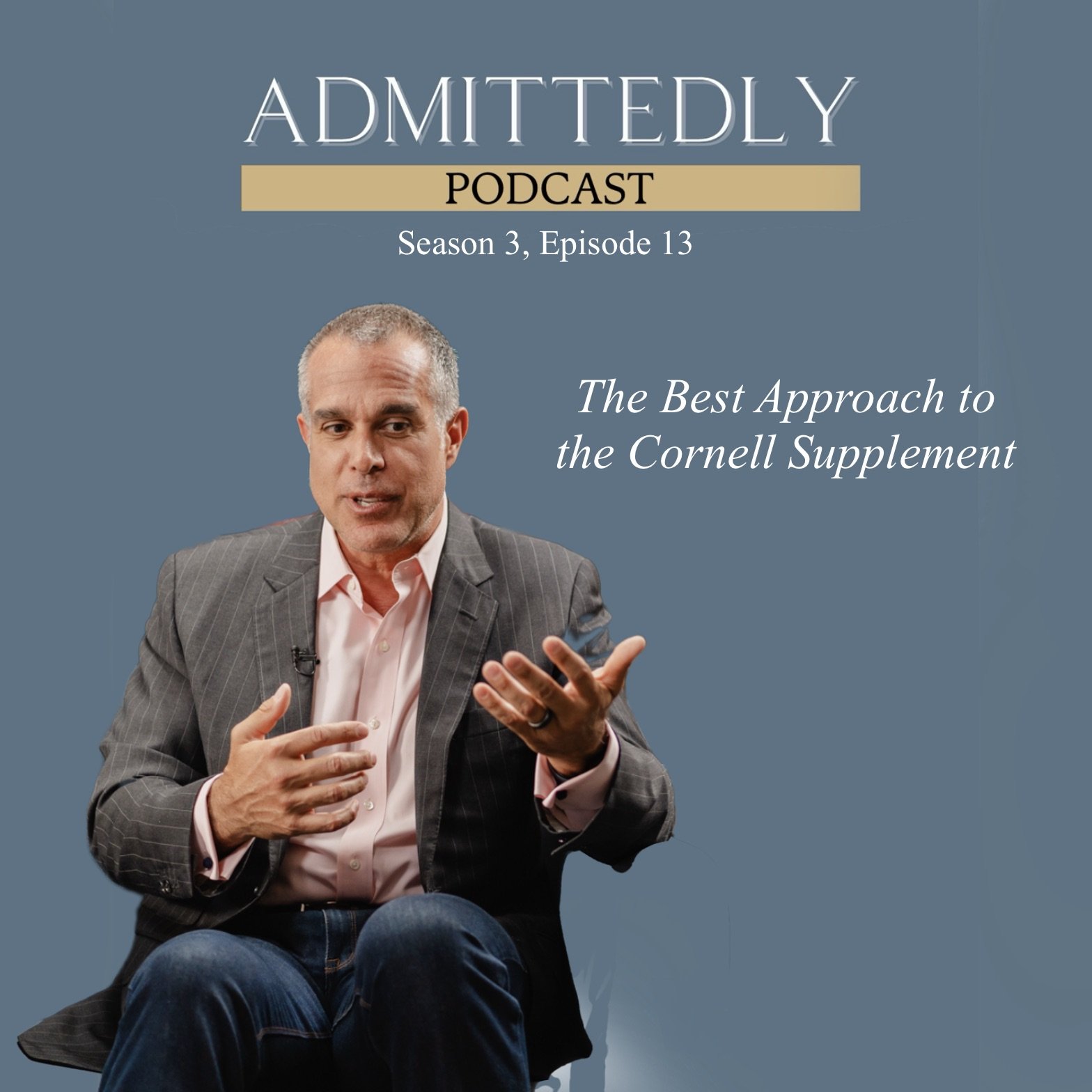S3E13: The Best Approach to the Cornell Supplement (2024)
Today's question of the week: "How should I approach the Cornell Supplement?”
LISTEN NOW
Today's question of the week: “How should I approach the Cornell supplement?"
Introduction: In this episode of the "Admittedly" podcast, host Thomas Caleel explores the Cornell supplement essay, which asks applicants to discuss a community that is meaningful to them. With a 350-word limit, Thomas offers guidance on how to effectively narrow down your focus and craft a compelling narrative that reflects your personal identity and how it will shape your experience at Cornell.
Summary of Key Points:
1. Selecting the Right Community: Cornell's essay invites you to discuss a community that is significant to you. Thomas advises selecting one or two key communities to focus on, ensuring your essay remains concise and impactful within the 350-word limit.
2. Personalizing Your Community: It's essential to define your chosen community not just in general terms but in a way that highlights its unique significance to you. Thomas emphasizes the importance of discussing how this community has influenced your life, your perspective, and your journey to this point.
3. Connecting to Cornell: Thomas encourages applicants to tie their community experience to their future at Cornell, whether through academic pursuits, campus activities, or clubs. Demonstrating how your background will inform your contributions to the Cornell community is key to a successful essay.
4. Understanding the Prompt: Cornell provides a broad definition of community, encompassing family, school, shared interests, virtual spaces, and more. Thomas reminds listeners to read the prompt carefully, as it reveals what the university values and seeks in its applicants.
5. Bringing Your Experience to Life: Your essay should reflect both the positive and negative aspects of your community experience, showcasing how these experiences have shaped you. Thomas advises being honest and introspective, as this will help convey a more authentic and relatable narrative.
Conclusion: The Cornell supplement is an opportunity to share a meaningful aspect of your identity and how it will influence your contributions at Cornell. By following Thomas Caleel’s advice, applicants can craft a focused, personal, and impactful essay that resonates with admissions officers.
Have your own question you want answered? Leave us a comment on social media @admittedlypodcast for a chance to be featured.
About Thomas Caleel:
Thomas is an alumnus of the University of Pennsylvania. After earning his MBA at the Wharton School of Business in 2003, he moved to Silicon Valley. For three years, he was Director of MBA Admissions and Financial Aid at Wharton. He worked closely with admissions professionals, students, alumni, and professors to curate the best possible MBA class. Thomas has been an entrepreneur his entire life in the fields of finance, agriculture, wellness, and sporting goods. As the founder of Global Education Opportunities LLC, he works as a high-level admissions advisor to help families and students achieve their education goals. Thomas started the podcast Admittedly because he is passionate about demystifying the application process for all parents and applicants.
Related Links
Apply to be a guest: www.thomascaleel.com/apply-for-podcast
Follow Admittedly on Social Media
TikTok: @admittedlypodcast
Instagram: @admittedlypodcast
-
Let's talk about the Cornell supplement. It's a 350-word essay. We all contribute to and are influenced by the communities that are meaningful to us, and it asks you to talk about a community that you are a part of that is meaningful to you. Some of you might have one community, some of you might have several, and I think it's important if you have several to make sure that you narrow them down to the top, let's say, two, maybe three maximum, because it's very easy to kind of get too diffuse in a 350-word essay. This is going to go by very, very quickly. We want to start by defining the example of community that you're talking about, right? And not just defining it in the general sense, but what does it mean to you?
Whatever it is that's a part of your identity, you have to think about it. You have to personalize it and talk about its impact on your life, how it has brought you to this point, and how it will inform your choices and actions as a Cornell student. So we want to bring it forward. Maybe it is relevant to what you want to study. Maybe it's relevant to communities that you'll get involved with at Cornell, clubs that you want to join, activities that you want to do. And for those of you who are thinking, oh, well, community, diversity, I'm not really sure how this works. This affects me. I think it's very interesting. And you want to read every single word of these questions.
Because in the questions, the schools are communicating their values, and they're communicating a little bit for what they are looking for from the applicant pool. And Cornell is very interesting, because it says some examples of community you might choose from are family, school, shared interest, virtual, local, global, cultural. So there are a lot of opportunities here. If you are very active online, let's say you have an active social media account. Let's say you have a million, two million followers. That is a community. That is something that you can absolutely talk about here. Maybe it is family. Maybe you come from a very tight-knit, large family. And so a lot of your responsibilities and commitments are to the family. And that's a very important part of your cultural identity. Whatever it is, you want to make sure that it's always about you and the way you view the world through this lens. How has it impacted you, positive and negative? And how will you bring that experience, positive and negative, to Cornell and use it to shape the learning of not just yourself, but your classmates around you?
